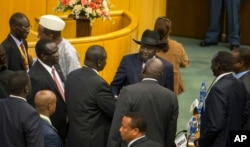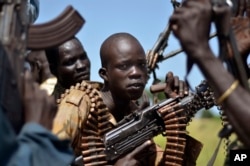War crimes, including killings, systematic rape, and forced disappearances remain daily occurrences in South Sudan, as highlighted in reports this month from the United Nations, Amnesty International and Human Rights Watch. Some advocacy groups say sanctions and other targeted measures could make an impact where a peace deal has failed.
The situation in South Sudan rapidly deteriorated after fighting broke out in December 2013, resulting in “serious and systematic violence against civilians,” according to the U.N.
Amnesty International found that government forces suffocated more than 60 men and boys to death in Unity State last October, and Human Rights Watch has found evidence of “grave abuses” in the Western Equatoria region.
Ian Schwab is the director of advocacy and impact strategy at the Enough Project, a Washington-based Africa advocacy group.
“What we see is a situation where there’s gross violations of human rights, looting of state coffers and natural resources, and all the while, a total lack of accountability for any of these, you know, for any of these horrific crimes that are being reported,” said Schwab.
Signatories to an August 2015 peace deal have yet to form a transitional national unity government, originally planned for November. President Salva Kiir and opposition leader Riek Machar continue to disagree over the demilitarization of Juba, among other issues.
Violence has continued, and the country is in the grips of a full-fledged humanitarian crisis with more than two million people displaced and the U.N. warning of famine.
The Enough Project is recommending targeted sanctions.
“Well, we think the best places to start are to designate higher level officials that are involved in these crimes and to make sure that those sanctions designations are enforced. We’re not talking about any sort of comprehensive sanctions that would impact the country. We’re looking at particular individuals that have been complicit and directed these types of crimes and have been looting state resources,” he said.
Arms embargo
Human Rights Watch senior Africa researcher Jehanne Henry suggests the U.N. impose a comprehensive arms embargo on South Sudan.
“We think that an arms embargo should have been applied a long time ago, the conflict started in December of 2013, and some of the worst episodes of fighting happened in the weeks and months that followed. We think that an arms embargo was appropriate back then, at the beginning, when it was so clear that that was a war that was being waged not between soldiers but against civilians,” said Henry.
South Sudan has been free to engage in state-to-state transfers in arms, without restrictions from sellers. Ukraine, for example, has sold the government light and heavy machine guns, as well as attack helicopters.
Countries such as Britain and France support the idea of an embargo. The United States has argued that an arms embargo would give rebel forces an advantage, with Russia, China and Angola also opposed.
Human Rights Watch is also calling for the African Union to fast track plans to set up a hybrid court for South Sudan.
“It sends a message that people will be held responsible for allowing these abuses or for carrying them out,” said Henry.
The peace deal briefly raised hopes the fighting and rights violations would come to an end. But seven months later, many observers are questioning the deal's value.
They say the time has come for the international community to take new steps to end the misery in South Sudan.













